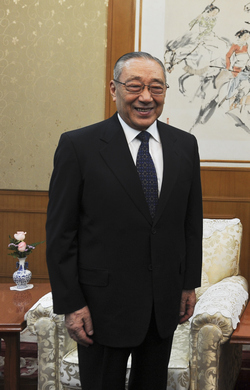Li Lanqing


Mr Li Lanqing
Doctor of Humanities, honoris causa (2011)
Mr Li Lanqing was born in 1932 and his ancestral home is at Zhenjiang of Jiangsu. He was former Vice Premier of the People’s Republic of China.
Mr Li graduated from the School of Business of Fudan University in 1952. Upon graduation, he contributed to the building of the automobile industry in China and later received practical training in automobile factories at the Soviet Union. After returning to China he assumed key positions in a number of automobile manufacturers. With over 20 years of experience in the manufacturing industry, Mr Li has accumulated profound knowledge in resources management which subsequently enabled him to devise strategies for China’s economic development.
Acclaimed for his vision, pioneering spirit and outstanding leadership, Mr Li has been appointed to a number of Central government positions including Director of the Foreign Investment Administrative Bureau of the Ministry of Foreign Economic Relations and Trade and Vice-Mayor of Tianjin. In 1986 he was appointed Vice-Minister of Ministry of Foreign Economic Relations and Trade and was responsible for implementing China’s policies in economy, foreign trade and investment; in 1990 he was promoted to Minister of Ministry of Foreign Economic Relations and Trade. In 1993 Mr Li became Vice Premier of the State Council. He played an instrumental role in the formulating and implementing of foreign trade relations policies of China in the 1990s. With his rich knowledge in international trade and sophisticated diplomacy, Mr Li has conducted many successful visits to friendly nations to ease international tensions and built fruitful bilateral relations. During his 10-year tenure as the Vice Premier of the State Council, Mr Li oversaw the country’s economy and trade as well as education, culture and technology affairs. In an era of rapid economic development in the history of China, Mr Li remained steadfast in implementing the policy of nation-building through education and technology, and was keen to promote whole-person education that aimed to foster the ethical, intellectual, physical and aesthetical qualities in a person. He placed his faith in quality education as the sole means to nurturing high-calibre individuals and achieving valuable research outcomes, and to satisfy the needs of national economic developments. Mr Li boldly implemented structural reforms and allocated hefty resources into education nationwide and across all social strata. The measures implemented included, inter alia, reforming educational institutions, building additional infrastructure, enhancing teachers’ training and providing vocational training. To ensure the successful implementation of these endeavours, Mr Li had paid personal visits to schools and universities across the country. Technology-wise, Mr Li paid special attention to the integration between education, research and production, the building of science parks and regional infrastructure, and the development of high-tech industries and modern sales networks.
Another notable achievement during his service as Vice Premier of China was Mr Li’s leadership in China’s successful bid for the Olympic Games 2008 and for Shanghai’s hosting of the World Expo 2010. At the Moscow conference held in 2001, he lobbied for the support of friendly countries on behalf of the PRC Government, and made a powerful speech which greatly impressed members of the International Olympic Committee and contributed greatly to China’s success in winning the bid. In 2002, Mr Li again led the Chinese delegation to win for Shanghai the honour to host the World Expo 2010. The successful hosting of the two events demonstrated to the world the brand new image of China, and brought the cities of Shanghai and Beijing new world-class infrastructure and the people of China enhanced national identity. Mr Li has contributed greatly to these two events that brought China to the world stage.
In 2003, Mr Li retired from the political arena and began to devote himself to the exploration of art and culture. He was particularly learned in the areas of seal engraving and classical music. His published works include Li Lanqing’s Remarks About China’s Educational Reform, Essays on Li Lanqing’s Music—European Classics, Essay’s on Li Lanqing’s Music—Modern and Contemporary China, The Intriguing World of Seal Engraving, Breaking Through: The Birth of China's Opening-up Policy, A Collection of Seal Cutting and Calligraphy Works by Li Lanqing, and Pencil Drawings of the Great Masters. His Essays on Li Lanqing’s Music—European Classics received the Guo Moruo’s Award for Essays from Chinese Writers Association. Over the years, Mr Li has also staged exhibitions of his seal engraving artworks across the country and in major cities overseas, including Singapore, Paris, Moscow and Jakarta.
Mr Chairman, for Mr Li Lanqing’s tremendous contributions to China’s economic developments and educational advancement; for his significant role in building relationships with China’s friends and promoting China’s image internationally; and for his dedication to the promotion of education, culture and the arts, it is my privilege to present him to you for the award of the degree of Doctor of Humanities, honoris causa.